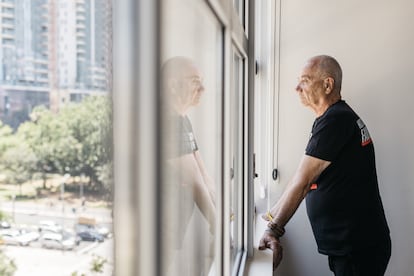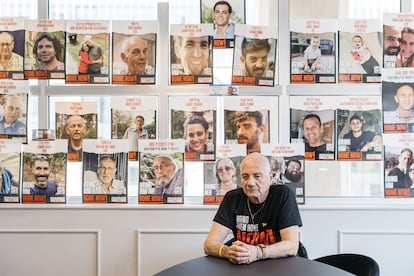Luis Har, hostage rescued in Gaza: ‘What was scariest was hearing the Israeli planes; we didn’t know where they were going to bomb’
The Argentine-Israeli, who spent 129 days with his captors, says he was treated with a mix of trust, caution and psychological warfare

Until October 6, 2023, Luis Har, 71, was an anonymous citizen who divided his life in Israel between two kibbutzim near Gaza: Urim, where he settled after emigrating from Argentina in 1971, and Nir Itsjak, where his partner, Clara Marman, lived. That day, they were both enjoying the holiday with two of Clara’s brothers and one of Clara’s nieces and decided to stay the night. At dawn, a group of militiamen burst into the house, violently put them in a vehicle and took them to Gaza while a Hamas militiaman fired shots into the air and shouted “Allah is great.” The family became five (all with dual Argentine and Israeli nationality) of the more than 250 hostages who were taken by the Palestinian militias on October 7.
Their captors took them through a dark tunnel for three hours (one of the memories that marked Har the most) and they were held together in an apartment. Until November 28, when the three women were freed in exchange for the release of hundreds of Palestinian prisoners and a week-long ceasefire, the only ceasefire in eight months of war. Back then, Luis and his brother Fernando thought that they would be next. So much so that the five said goodbye with the phrase: “See you in two or three days,” said Clara Marman after her release.

That didn’t happen. On December 1, the ceasefire ended, without an agreement to extend it. “When we started hearing the [Israeli] bombings at 7:00 a.m., Fernando and I looked at each other and said: ‘We’re not leaving here.’ We understood that the agreement had ended, and we were a bit depressed. From that moment on, at the end of the day, we said: ‘One day less in prison.’ We knew it was one less. Not how many were left to go, but it gave us hope.”
They were to be held for 76 more days. What scared them most was hearing the Israeli planes. “We didn’t know where they were going or where they were going to bomb [...] Sometimes we could hear the hum of the bombs passing nearby, I don’t know if above us, or next to us. Glass in the windows shattered several times. It fell 200 or 300 meters and you could feel it. Everything was shaking like an earthquake. The floor was moving all over. First we felt the tremor and then the explosion. That really puts you on edge,” he recalls
Har cooked for everyone, including his captors, when he had the means. With an intact sense of humor, he remembers how on the first day the Islamist militiamen approached the oldest woman (Clara, 61 years old) with potatoes and told her to cook. She responded: “If they want to eat, Luis had better cook.” That was when “there was everything” needed to make dishes. But soon, due to Israel’s obstacles on the entry of humanitarian aid — which has left areas of Gaza on the brink of famine — there were days when they barely got pita bread to share.
When the two men were left alone, they fantasized — half jokingly, half seriously — that an Israeli special forces commando would appear and rescue them. And that’s exactly what happened on February 12, amid heavy bombing that caused dozens of deaths. Har asked one of the soldiers to confirm that “he was not in a movie.”
It is, he says, how he still feels today. He’s treated like a celebrity; everyone waves and smiles at him in the Tel Aviv building where he greets this newspaper. The building is the headquarters of the Hostages and Missing Families Forum, the main lobby calling for negotiated return of the 129 remaining hostages in Gaza, at least a third of whom have died. The issue is now at the center of Har’s life: he is wearing a T-shirt with the message: “Bring them back home” and the yellow ribbon that identifies the movement. Har is still unable to return home to Kibbutz Urim because the so-called “safe room” to shelter from rockets fired from Gaza is still not finished. Today, rockets fall more sporadically, but more than 3,000 were launched in just a few hours on October 7.
During his captivity, Luis Har — who is one of only seven hostages rescued by the Israeli army in eight months —, did not feel that his captors hated him. “They accepted us as we are. There was no intention to kill us, but it was a strange situation for them and for us,” he describes. Although they never said so, Har felt that they would have been happy to have handed the hostages over “on the second day.”
But time passed, without any prisoner swap agreement, and the captors and the hostages developed a kind of implicit pact based on trust. “I’m here now also because they felt they didn’t have to fear us. That there was a certain trust that we were in the same thing together. [...] They didn’t see their family either, they didn’t see anyone. They were there with us […] We tried to show them trust. That we were not going to escape, or challenge them.”

The captors never hit them. Sometimes they all ate together. But Har never wanted to forget their place in the equation. “We knew that if they received the order to kill us, they would not hesitate. They would kill us on the spot,” he says. Nor did he forget the “limits” on what to say or how. They avoided talking about politics. He dared to once and it didn’t turn out very well. “[The owner of the house] told us: ‘What are you doing here? You are Argentines. Go live in Argentina. This is Palestine. And there was no way to convince him otherwise. I tried to talk a little, but I saw that there was no point.”
Luis distinguishes between “the owner of the house” where they were kidnapped — with whom he ended up developing a “sort of trust” — and the militiamen who would pass by and were “more aggressive” and always armed. With the former, they came to “exchange thoughts” as they could. “Hands, legs, eyes… Anything goes as long as you understand yourself. I don’t understand Arabic. He [the owner] didn’t understand much Hebrew. A few words here or there, in English. In the end we understood each other and with him, we were able to reach a certain dialogue about different things.”
They even joked. “Once I told him, what’s going on here!? There is no flour, there is no meat… There is nothing. He looked at me like, laughed and told Fernando: ‘just protest.’ I told him: ‘You know what? I’m leaving.’ Do you know what he did? He opened the door for me and did this [imitates an invitation to leave with his hand]. ‘No, no, I’m staying. Thank you…’. Going out there with everyone... That explains the situation a little. That in spite of everything, he knew how he was with us.”
However, along with the jokes, there was “psychological warfare.” The captor, for example, told them: “Why are you going to return to the kibbutz if in two or three years we will bomb it again?” Or he asked them to keep their voices down, so that the Israeli drones flying over Gaza would not detect them and that Israeli Prime Minister Benjamin Netanyahu would send the fighter-bombers to destroy the building, because he preferred the hostages than able to being used in a prisoner swap. “Every time the army knocked down a building” in Gaza, they were told that many Israeli kidnapped people had died. Although they lacked access to cell phones and news, they were aware that they were not the only hostages and were even proudly told that the real number was more than 250.
With the militiamen, he clarifies, “you had to take more care.” He never saw them smile, and the only interaction he had was when one approached him after eating and said, in passing and quietly so that others would not hear: “Thank you for the food.”
Har insists twice that he was not afraid, which is not the word. It was “take care of yourself, survive.” He says being held captive led to low mood, and they supported each other depending on who of the five was the most healthy. “You can only be sitting or lying down. You can’t decide or do anything. We didn’t have a piece of paper or a pencil. Nothing. And so the days passed by…” As time seemed eternal, Luis — passionate about theater, folk dancing and cooking — tried to kill it by telling stories. They also imagined trips (“we were talking about returning to Bariloche, to the Iguazú Falls, to Ushuaia”…) and shared recipes for an uncertain future.
They did not know that tens of thousands of Israelis were demonstrating for their release. Nor that their images decorated streets, squares, overpasses and even the country’s main airport. He had come to terms with the idea that he could die in Gaza, and he was at peace with that. He felt that, at 71 years old, he had lived long enough and that he had left his “signature” — as he described it — on his four children and 10 grandchildren. “We didn’t think that [the authorities] forgot about us, but rather that time was passing and nothing was happening […] We didn’t even know if we were important enough. That’s why it was a surprise that they took us out of there how they did.”
He says that he doesn’t want to talk about politics, but in the end he can. He believes that the experience has changed his way of seeing the Middle East conflict. Har no longer believes there is “anyone to live with,” nor does he want to see his “Gazan friends who worked in the kibbutz” again. He returned one day to the other kibbutz, where he was kidnapped, and was deeply affected: “I couldn’t even get into the house. It was like I was paralyzed.”
Sign up for our weekly newsletter to get more English-language news coverage from EL PAÍS USA Edition
Tu suscripción se está usando en otro dispositivo
¿Quieres añadir otro usuario a tu suscripción?
Si continúas leyendo en este dispositivo, no se podrá leer en el otro.
FlechaTu suscripción se está usando en otro dispositivo y solo puedes acceder a EL PAÍS desde un dispositivo a la vez.
Si quieres compartir tu cuenta, cambia tu suscripción a la modalidad Premium, así podrás añadir otro usuario. Cada uno accederá con su propia cuenta de email, lo que os permitirá personalizar vuestra experiencia en EL PAÍS.
¿Tienes una suscripción de empresa? Accede aquí para contratar más cuentas.
En el caso de no saber quién está usando tu cuenta, te recomendamos cambiar tu contraseña aquí.
Si decides continuar compartiendo tu cuenta, este mensaje se mostrará en tu dispositivo y en el de la otra persona que está usando tu cuenta de forma indefinida, afectando a tu experiencia de lectura. Puedes consultar aquí los términos y condiciones de la suscripción digital.









































